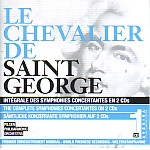This is gracious, typically attractive music. It was composed in the mid-1770s, and all four works feature two solo violins plus orchestra. Three symphonies have only two movements: a moderately paced opening (one is actually a real allegro), and a concluding Rondeau that gives the soloists plenty of opportunity to show off. Op. 6 No. 2, though, is a full-fledged symphony in three generous movements. It’s very beautiful, with an Andante amoroso second movement very much in the style of Cherubini (thank God this isn’t an “authentic” performance–it would sound abominable without a nice, healthy fund of vibrato).
The performances here are very good, certainly much more than provincial, and if perhaps the music lacks much contrast between movements, it’s really the composer’s fault for preferring moderate tempos in succession. The soloists are also all very good, and the engineers have balanced them quite naturally against the larger ensemble. A little of this music goes a long way; we expect more drama and tension than Saint George ever offers, but then none of these pieces is excessively long. If charm is what you’re after, you might very well enjoy investigating this. [8/10/2009]
































